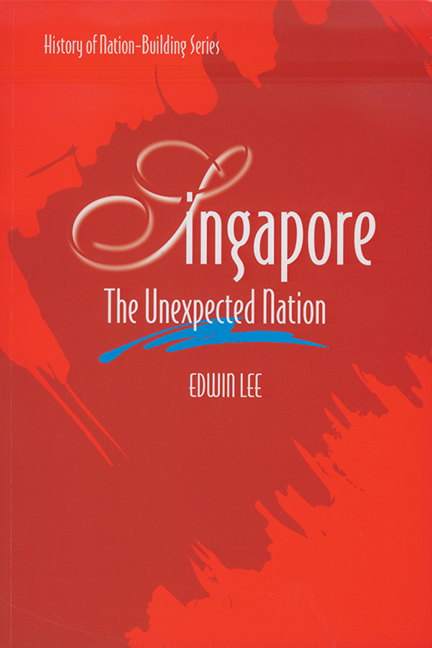Book contents
- Frontmatter
- Dedication
- Contents
- Preface
- Introduction by Wang Gungwu
- Chapter One Beginnings: From Temasek to Singapore
- Chapter Two Race, History and Nationalism
- Chapter Three Contestants and Contesting Visions
- Chapter Four The Accidental Chief Minister
- Chapter Five The Terminal Chief Minister
- Chapter Six The Embattled Prime Minister
- Chapter Seven Merger: Contesting Ownership and Principles
- Chapter Eight Terms of Disendearment
- Chapter Nine Dare to be Equal
- Chapter Ten The Way to Survive
- Chapter Eleven National Service: The Price of Independence
- Chapter Twelve Politics of Education
- Chapter Thirteen Home Ownership, National Stability and the New Middle Classes
- Chapter Fourteen University and Nation
- Chapter Fifteen Toh's Nation-Building Thrust
- Chapter Sixteen Nantah: Between Community and Nation
- Chapter Seventeen Self-Renewal: Talents for a Tough Act
- Chapter Eighteen The Consensual Prime Minister
- Chapter Nineteen Confucianism, Christianity, Chineseness
- Chapter Twenty Singapore Dreams, Singapore Dilemmas
- Chapter Twenty-One The Hyphenated Singaporean
- Chapter Twenty-Two The Unexpected Nation
- Bibliographical Note
- Index
- The Author
Chapter Seven - Merger: Contesting Ownership and Principles
Published online by Cambridge University Press: 21 October 2015
- Frontmatter
- Dedication
- Contents
- Preface
- Introduction by Wang Gungwu
- Chapter One Beginnings: From Temasek to Singapore
- Chapter Two Race, History and Nationalism
- Chapter Three Contestants and Contesting Visions
- Chapter Four The Accidental Chief Minister
- Chapter Five The Terminal Chief Minister
- Chapter Six The Embattled Prime Minister
- Chapter Seven Merger: Contesting Ownership and Principles
- Chapter Eight Terms of Disendearment
- Chapter Nine Dare to be Equal
- Chapter Ten The Way to Survive
- Chapter Eleven National Service: The Price of Independence
- Chapter Twelve Politics of Education
- Chapter Thirteen Home Ownership, National Stability and the New Middle Classes
- Chapter Fourteen University and Nation
- Chapter Fifteen Toh's Nation-Building Thrust
- Chapter Sixteen Nantah: Between Community and Nation
- Chapter Seventeen Self-Renewal: Talents for a Tough Act
- Chapter Eighteen The Consensual Prime Minister
- Chapter Nineteen Confucianism, Christianity, Chineseness
- Chapter Twenty Singapore Dreams, Singapore Dilemmas
- Chapter Twenty-One The Hyphenated Singaporean
- Chapter Twenty-Two The Unexpected Nation
- Bibliographical Note
- Index
- The Author
Summary
The Tunku's volte-face on the merger shocked everybody — the British, Lee Kuan Yew, and the Plen. For the British and Lee, who were overjoyed, it meant to get cracking right away. For the Plen, it called for a new angle. This was to demonstrate that the PAP Government was going to sell out Singapore. Through the Barisan, the communists used the constitutional method of opposition and avoided any resort to violence, choosing instead to tackle the PAP Government verbally, point by point, argument by argument, in public debate. For all other opposition parties in Singapore, the merger was an opportune time to revive themselves and stake claims to a piece of the action, and to speak out on matters of principle: what form should the merger take? Who should decide this? The PAP Government, as the chief stakeholder, was not going to have an easy time of it.
The synergy between merger and internal security was seen in two events in August 1961. The first was a meeting of the Internal Security Council at Cameron Highlands which Lee and Dr Goh Keng Swee attended. This meeting dovetailed nicely into another, in Kuala Lumpur, at which they conferred with Tunku Abdul Rahman and Tun Abdul Razak on the merger. Afterwards, on 23 August, the Malayan and Singapore prime ministers jointly issued a communiqué stating that they had reached agreement in principle. They mentioned two specific points, namely that (1) internal security, external affairs, and defence would be the responsibility of the Federation of Malaya and (2) Singapore would retain “local autonomy especially on matters of education and labour”. It was “also agreed that a working committee should be set up to go into the overall financial and other implications” of a merger on these terms.
It was clear from the first interview Lee gave to reporters after the joint communiqué that “the question of Singapore citizenship in the event of merger” was a problematic one. When asked about it Lee merely said: “this [along with a host of other topics] was also a matter for the working party” to go into, but that “as far as he could see, there could be no disagreement that Singapore citizens and Federal citizens would be Malayan or Malaysian nationals” (my italics).
- Type
- Chapter
- Information
- SingaporeThe Unexpected Nation, pp. 189 - 216Publisher: ISEAS–Yusof Ishak InstitutePrint publication year: 2008

